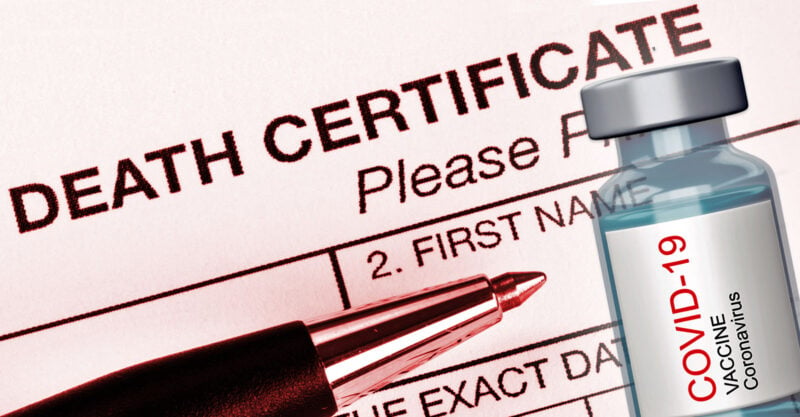Rhode Island Stonewalls Physician’s Request for Data on Woman’s Suspicious Post-Vaccine Death
According to Andrew Bostom, M.D., M.S., an academic clinical trialist, epidemiologist and research physician, Rhode Island health officials are either indifferent to vaccine injury data requests, or actively refusing to honor the requests in an effort to hide the data.
Miss a day, miss a lot. Subscribe to The Defender's Top News of the Day. It's free.
By Andrew Bostom, M.D., M.S.
On June 13, 2021, a 22-year-old, otherwise healthy Korean military recruit, five days after receiving the first dose of a (Pfizer-BNT) mRNA COVID-19 vaccine, complained to a colleague of chest pain at 1 a.m. but went to bed.
He was found unconscious hunched by the bedside at 8 a.m. Rushed to the emergency department, his electrocardiogram showed ventricular fibrillation (a chaotic and lethal heart rhythm if not corrected), and despite two hours of cardiopulmonary resuscitation efforts, he could not be resuscitated.
Autopsy examination revealed diffuse inflammation within his heart muscle (myocardium), and particularly in the heart’s unique cardiac impulse conduction system (around the sinoatrial and atrioventricular nodes).
This tragic case was analyzed in the October 2021 issue of the Journal of Korean Medical Sciences, and the authors concluded that the recruit’s sudden cardiac death was caused by a COVID-19 vaccine-induced myocarditis (heart inflammation), which triggered a paroxysmal, fatal arrhythmia.
A similar sudden cardiac death (SCD) case — this time in a healthy 27-year-old Japanese athlete — occurred eight days after he received another COVID-19 mRNA vaccine (i.e., Moderna).
According to the report in the Journal of Cardiology Cases, on July 3, 2022, his teammates found him, “sitting unconscious during practice,” and he too could not be resuscitated in the emergency department after presenting in asystole (i.e., with no cardiac activity).
Once again, an autopsy showed extensive inflammation of the heart, “which led to the diagnosis of … fulminant myocarditis,” resulting in fatal arrhythmogenic SCD.
These two peer-reviewed case reports have been confirmed and externally validated by much broader peer-reviewed studies.
Both German and Korean populations subjected to systematic autopsy of persons dying suddenly within a week (Korea), or up to 20 days (Germany) after COVID-19 vaccination, have confirmed the causal association between COVID-19 mRNA vaccine-induced myocarditis, and SCD among men, and less commonly, women.
The German study included healthy 62- and 50-year-old female SCD cases, while the Korean study reported younger female SCD cases, aged 30- and 36-year-olds.
The latter young Korean women SCD cases are most germane to a 37-year-old Rhode Island female case of SCD after COVID-19 mRNA vaccination I recently discovered, initially, by examining the passive surveillance Vaccine Adverse Event Reporting System (VAERS).
As discussed in a March 15 email to the Rhode Island Department of Health (RIDOH) State Medical Examiners (SME) Office, I found an “admittedly very flimsy (VAERS report) on a possible RISME [Rhode Island State Medical Examiner] Office case.”
VAERS report 2375029-1 crudely described a 37-year-old Rhode Island female vaccinated with her second dose of a Moderna COVID-19 mRNA vaccine on 5/13/21, who died 12 days later, on 5/25/21. Schematic information entered in the “symptom” section of the VAERS report, included: “autopsy,” “myocarditis,” “death.”
Additional event description and “lab data” sections stated, “Patient was found drown (sic; drowned) in bathtub at home”; “Reason for death: Lymocytic (sic; Lymphocytic) myocarditis”; “On authopsy (sic; autopsy) report: heart infalmation (sic; inflammation).”
My email concluded, “If such a case, & accompanying report exist, I would like a redacted/de-identified copy of the autopsy report.”
This request was referred to RIDOH/RISME legal counsel, immediately, and by March 29, 2021, RIDOH/RISME had effectively corroborated the extremely limited VAERS report I sent them by matching it to a redacted autopsy report and sending that autopsy report to me.
The autopsy confirmed all the schematic VAERS report claims: a 37-year-old woman was found drowned in her bathtub and suffering from lymphocytic myocarditis. As summarized by the general forensic pathologist, here are the key findings from the ancillary-specific cardiovascular pathologist report:
“Examination of the heart by a cardiovascular pathologist shows focal lymphocytic myocarditis involving the cardiac conduction system [Note; see 22-year-old Korean case, above]; it is believed that the decedent was at risk for a sudden cardiac arrhythmia/ event, and that it is likely that such an event preceded/contributed to the drowning of the decedent.”
Critically, what one also gleans from the autopsy report is that the 37-year-old female decedent was free of any serious, chronic comorbidity — certainly in all the major organ systems examined, grossly, including the cardiovascular system.
Moreover, she was not on medical therapy, and had no evidence of significant external injury, per the report.
Encouraged by this initial RIDOH/RISME response, I filed a follow-up request (receipt acknowledged March 30) for additional redacted information to elucidate, objectively, the potential etiology of the 37-year-old female decedent’s presumed fatal arrhythmogenic myocarditis:
“Is the separate examination of the by a cardiovascular pathologist also perhaps available in redacted form?”
“In follow-up to my initial request, I am now requesting the full (but redacted from any personal identifiers) cardiovascular pathology report from the cardiovascular pathologist, as well as the toxicology report, the latter with particular attention to testing done to rule in/rule out specific etiologies of myocarditis, including infectious, autoimmune, chemical/toxic, as well as antibody testing (i.e., SARS-CoV-2 spike AND nucleocapsid antibodies, etc.), and PCR [polymerase chain reaction] antigen testing germane to BOTH SARS-CoV-2 infection, and COVID-19 vaccination, the latter with particular attention to COVID-19 mRNA vaccination.
“I am also requesting any redacted clinical records in the possession of RIDOH/The Medical Examiner’s Office which elaborate the decedent’s clinical history just prior to death, including known conditions/comorbidities treated (if any), and what RIDOH/The Medical Examiner’s Office has in its possession regarding any confirmation of the timing of her COVID-19 vaccine administration, given the independent data in VAERS report 2375029-1, which I have attached, yet again.”
Not only was this request denied, but so was a subsequent formal legal appeal for these de-identified data filed on my behalf by the Siri/Glimstad law firm (denial here).
This final RIDOH denial on June 13, included the bizarre, counterfactual allegation by RIDOH’s director, Dr. Uptala Bandy, that my tweet on March 29, (RIDOH screenshot here) somehow purposefully, “solicit(ed) information from the public for the purpose of re-identifying the patient whose information had been redacted.”
RIDOH’s stonewalling on the plausible connection between this apparently healthy 37-year-old’s SCD, and her COVID-19 mRNA vaccination 12 days earlier, is lamentably consistent with established behavior.
Bandy, RIDOH’s current director, was a co-author of “Monitoring Vaccine Adverse Event Reporting System (VAERS) Reports Related to COVID-19 Vaccination Efforts in Rhode Island,” published in the September 2021 issue of The Rhode Island Medical Society Journal.
The Rhode Island Medical Journal (RIMJ) report described how a RIDOH “vaccine surveillance team” met regularly (i.e., each week) to review VAERS data from Rhode Island residents categorizing the severity, and updating the frequency, of adverse events associated with COVID-19 vaccination.
These efforts were geared, allegedly, toward identifying, “cases of significant interest and respond to media and data requests in a timely manner.” VAERS and the RIDOH “vaccine surveillance team” included myocarditis/pericarditis, specifically, as a serious adverse event of (particular) interest:
“Events of interest include reports of anaphylaxis, Guillain-Barré syndrome, immediate allergic reactions, thromboembolic events, myocarditis/(pericarditis), and select others.”
During a 6/29/22 to 7/1/22 email exchange with RIDOH’s spokesman Joseph Wendelken, I pointed to a 6/9/22 published Brown University Cardiology Division report of 14 Rhode Island cases of post-COVID-19 vaccine myopericarditis in young men and the May 2021 newspaper account of how Connecticut’s Department of Health (DOH) had responded to similar cases in Connecticut.
Already by then, Connecticut’s DOH tabulated 18 such cases in 16-to 34-year-old men, noting further that the “number and severity of cases is being tracked … by the state of Connecticut to gain more information.”
The brief, disinterested response Wendelken provided to my queries about whether RIDOH had “1) issued any similar statements, in 2021 or 2022, and 2) is RIDOH in fact compiling and tracking such cases?” was:
“As you know, CDC (Centers For Disease Control and Prevention), FDA (U.S. Food and Drug Administration), and HHS (Health and Human Services) maintain a reporting and tracking system for vaccine adverse events.
“The State (RI) does not maintain a separate system. We have not issued any statements on myopericarditis post-COVID-19 vaccination.”
Wendelken’s candid assertions contradict the COVID-19 vaccine adverse event monitoring and reporting claims of Bandy and her RIDOH colleagues published 10-months earlier in the RIMJ.
Regardless, Wendelken’s candor captures the reality: since the September 2021 RIMJ report, there have been no further RIDOH efforts, till now, to report COVID-19 vaccine adverse event “cases of significant interest,” nor has RIDOH typically “responded to [COVID-19 vaccine-related injury] media and data requests in a timely manner.”
Timeliness notwithstanding, RIDOH’s record vis-à-vis COVID-19 vaccine injury data requests is one of indifference, or — as my current experience demonstrates, ultimately — active obfuscation and opacity.
Originally published by Brownstone Institute.
Andrew Bostom, M.D. MS, is an academic clinical trialist and epidemiologist, who is currently a Research Physician at the Brown University Center For Primary Care and Prevention of Kent-Memorial Hospital in Rhode Island.
The views and opinions expressed in this article are those of the authors and do not necessarily reflect the views of Children's Health Defense.
Sign up for free news and updates from Children’s Health Defense. CHD focuses on legal strategies to defend the health of our children and obtain justice for those injured. We can't do it without your support

